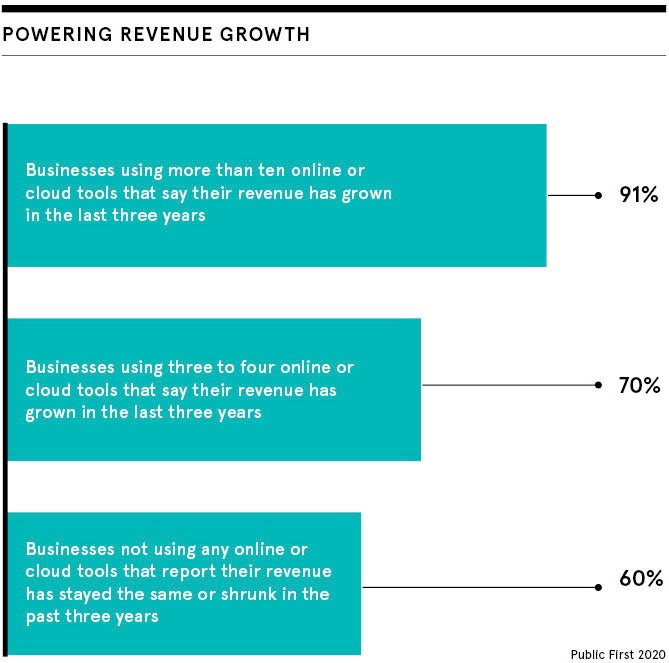
Rest Less is a startup that aims to help the over-50s get the most from life, from new jobs to financial wellbeing, volunteering, learning and more. Its founder and chief technological officer (CTO) Sara Stephens explains that the company was built in the cloud and this has enabled it, like many other cloud-native businesses, to scale up rapidly, while keeping costs down.
“We have enterprise-grade infrastructure for a tiny little startup; it’s so much more efficient,” she says. “While we knew about the benefits of cost and speed compared to on-premises infrastructure, we hadn’t thought about the added benefit of being able to react quickly to change our infrastructure.
“Our configuration wasn’t quite in the sweet spot it needed to be in and it was really easy to reduce our costs, whereas if you purchase kit, you can’t just get rid of it to reduce costs.”
For David Bishop, founder and CTO of ecommerce site Love the Sales, without cloud computing there wouldn’t have been a company. It simply would not have been able to handle a growth in demand without having to pay extortionate, unviable fees.
We can change our capacity more dynamically, spinning up servers and shutting them down when we don’t need them
“If we had to purchase enough servers to cater for Black Friday and run them through the whole year, [that would be] a huge, unnecessary cost, which is significant for small businesses like ours,” he says.
“With cloud computing we can change our capacity more dynamically, spinning up servers and shutting them down when we don’t need them.”
Cloud-native businesses enjoy greater agilty
Reacting quickly is a trait that cloud-native businesses have embedded into their work culture from the outset. It means that when they require new services, they’re more easily able to decide what it is they need, who it is they need it from, implement these services quickly and adapt working practices to suit.
“We’re using cloud computing for our mobile device management and will be using it for mobile app management, and this has helped us with security. So we can now manage all devices and make sure they’re up to date and running their patches, feeding into the cybersecurity. It is hugely helpful as it would be an absolute pain to manage something like that on-premises otherwise,” says Stephens.

She explains that part of the ability to react quickly is that if an issue occurs, for example if the database grinds to a halt, companies can increase the size of that database. This will come into effect in a matter of minutes, which means business can continue while the company looks into the matter thoroughly, rather than having to take the website offline for a number of days to fix the issue.
According to Nicholas McQuire, analyst at CCS Insight, this cultural shift of being able to react quickly has meant many cloud-native businesses were most resilient when the coronavirus spread. “As they had embraced the cloud prior to COVID-19, they were able to react and change their businesses pretty quickly as a consequence of it,” he says.
“They’re more familiar with being able to pivot more swiftly, roll out products quickly and have the ability to scale up or down as and when they’ve seen a change to their macroclimate. This is all really part of the mindset of smaller startup businesses.”
Impact on IT staff working cloud-first
There are also benefits of being cloud native for IT staff as they have more control over the applications they build. “Whereas before you had one large structure, now the cloud enables you to have many smaller structures, which are much easier to manage and make changes to. This would have been very difficult to do when using on-premises infrastructure,” says Bishop.
In addition, IT staff have a bigger number of services they can deploy and experiment with. Many of the latest machine-learning tools are built on cloud infrastructure, while software-as-a-service, or SaaS, tools such as Zoom, Slack and Atlassian are used regularly by both cloud-native businesses and larger enterprises.
According to new research by Public First and Amazon Web Services, businesses that use more than three cloud tools are twice as likely to be growing than businesses that use none.
Cloud-native startups also rely less on IT support. “We were able to go remote overnight. It wasn’t a big issue; no one has had to go into the office to sort things out. We don’t have long-running IT support teams, but because it’s enterprise grade, it’s load balanced, it has disaster recovery so it if falls over, it just picks itself up again,” Stephens explains. “That isn’t just a cost saver; it’s a mental and physical-health saver for your staff.”

Creating new sectors, offshoots and thriving regions
Cloud computing is not just having an impact on startups that have used cloud infrastructure from the start. For instance, there is an industry within an industry, as cloud computing companies have small partner companies that consult on and develop technology solutions for the cloud.
Many small and medium-sized enterprises and larger outfits have also shifted workloads to cloud infrastructure in major transformation projects. Some of the biggest companies have created cloud-native offshoots focused on innovation. These innovation arms allow them to act much like a cloud-native startup, so they can experiment with technologies, fail fast and learn quickly.
The aim for these businesses is to then transfer their findings or working practices into the main organisations. The fact that they are trying to use this method shows they know cloud-native businesses have an upper hand when it comes to innovation.
As the pandemic has shown, cloud computing has been a major reason why so many businesses could transition quickly to remote working and change their business priorities. According to Public First, however, there is still a wide disparity in the uptake of cloud by businesses across the UK.
Public First found that if cloud prevalence in the North East matched that of London, it would help to boost local productivity and wages by 2.6 per cent, or £1.4 billion, the equivalent of three years’ pay rises. There would also be less reliance on tech hubs in London or Berlin, for example, as cloud computing can enable firms to set up anywhere.
While cloud computing is having a positive impact for many businesses, it is cloud-native startups that are setting the bar for the way in which cloud can be best utilised and others are following suit.

Rest Less is a startup that aims to help the over-50s get the most from life, from new jobs to financial wellbeing, volunteering, learning and more. Its founder and chief technological officer (CTO) Sara Stephens explains that the company was built in the cloud and this has enabled it, like many other cloud-native businesses, to scale up rapidly, while keeping costs down.
“We have enterprise-grade infrastructure for a tiny little startup; it’s so much more efficient,” she says. “While we knew about the benefits of cost and speed compared to on-premises infrastructure, we hadn’t thought about the added benefit of being able to react quickly to change our infrastructure.
